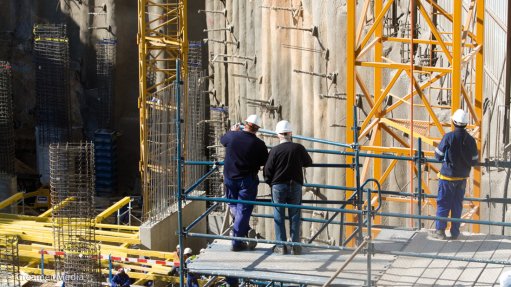
Photo by: Duane Daws
In the last financial year, construction and engineering firm Murray & Roberts invested almost one-third of its profits in skills development and in supporting small contractors.
By law, construction companies should have seven enterprise development partners; Murray & Roberts has 24, more than any other construction company in South Africa.
The bulk of this expenditure (R160-million) was directed at internal training and development, of which R110.3-million was invested in South African operations.
Investment in the group’s enterprise development initiatives totalled R143.4-million, while another R15-million was spent on community development projects in South Africa.
Infrastructure development is key to growth and there are many challenges the industry faces, including job creation, the training and retention of skilled artisans and support for small contractors, Murray & Roberts sustain- ability director Andrew Skudder tells Engineer-ing News.
He notes that large engineering and construction firms in South Africa have the capacity to take on major projects that can assist the construction sector because these firms have the balance sheet strength, record, know-how and management expertise to work on major projects, as well as the capacity to employ many people.
The investment of more than R100-million in the skills development of local operations spans the entire organisation, from leadership development programmes to artisan skills training, as well as engineering bursary schemes and secondary and tertiary education bursaries for employees and their families.
“There is a growing need from our clients – particularly State-owned enterprises and government bodies – to develop employment programmes and skills development programmes for local communities,” Skudder says.
He adds that Murray & Roberts has developed its capacity to deploy, train them and gainfully employ people on major projects so that they can gain experience.
“The people we employ from local communities do not have prior construction experience and many of them do not have prior work experience. For many of them, this is their first real work opportunity,” he notes.
Skudder points out that Murray & Roberts operates in a highly competitive industry and its aspiration is to earn a profit between 5% and 7.5% in the long term; however, in the current depressed economic environment, the company is earning below 5%.
He adds that important aspects of skills devel-opment are productivity and efficiency for a reasonable return for the company’s shareholders.
“It is not only about our own efficiency but also about delivering the quality that our clients require in the right timeframe and at the right cost. In a building project, for example, close to 70% of its value is subcontracted, so you need an efficient supply chain to be efficient and deliver projects on time,” he says.